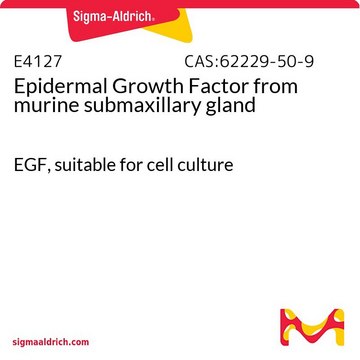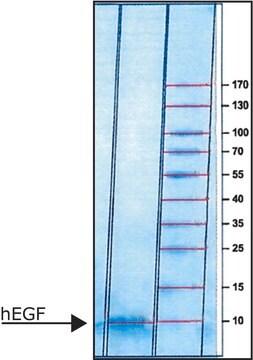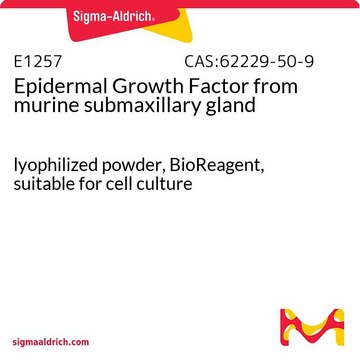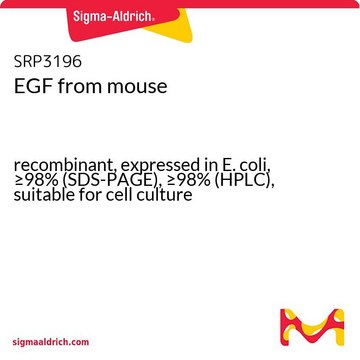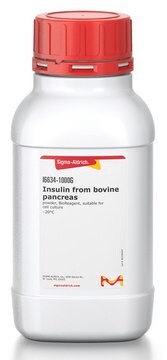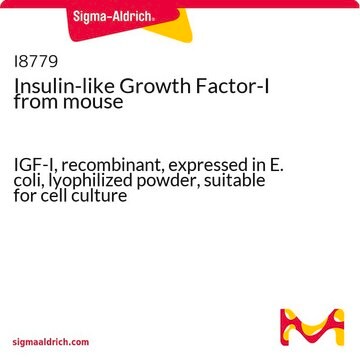E5160
Epidermal Growth Factor from mouse
≥90% (SDS-PAGE), recombinant, expressed in E. coli, lyophilized powder, suitable for cell cutlure
Sinonimo/i:
Mouse EGF, Mouse Epidermal Growth Factor
Autenticatiper visualizzare i prezzi riservati alla tua organizzazione & contrattuali
About This Item
Codice UNSPSC:
12352202
NACRES:
NA.77
Prodotti consigliati
Nome del prodotto
Epidermal Growth Factor from mouse, EGF
Origine biologica
mouse
Livello qualitativo
Ricombinante
expressed in E. coli
Saggio
≥90% (SDS-PAGE)
Stato
lyophilized powder
Potenza
0.05-1 ng/mL ED50/EC50
PM
~6 kDa
Confezionamento
pkg of 100 μg
Condizioni di stoccaggio
avoid repeated freeze/thaw cycles
tecniche
cell culture | mammalian: suitable
Impurezze
≤1 EU/μg endotoxin (Protein)
Colore
white
Solubilità
water: soluble 0.10 mL, clear, colorless
N° accesso UniProt
Temperatura di conservazione
−20°C
Informazioni sul gene
mouse ... Egf(13645)
Descrizione generale
Epidermal Growth Factor (EGF) is a small mitogenic polypeptide (∼6kDa) present in many mammalian species and distributed throughout a wide number of tissues and body fluids. Four ErbB (HER) family receptor tyrosine kinases, including EGFR/ErbB1, ErbB2, ErbB3, and ErbB4 mediate responses to EGF family members. Human and mouse EGFs are very similar, but not identical in their physical and chemical properties. Of the 53 amino acid residues comprising each of the two polypeptides, 37 are common to both molecules, and three disulfide bonds are formed in the same relative positions.
Applicazioni
Epidermal Growth Factor from mouse has been used as a basal (N2B27) medium supplement for culturing differentiated mouse embryonic stem (E14) cells.
Azioni biochim/fisiol
EGF (epidermal growth factor) is involved in cellular proliferation, differentiation, and survival. Moreover, it was found to affect various biological activities like angiogenesis, inhibition of gastric acid secretion, modulation of the synthesis of a number of hormones, synthesis and turn-over of proteins of the extracellular matrix, calcium release from bone tissue (thus promoting bone resorption), chemoattraction of fibroblasts and epithelial cells, and alone or in combination with other cytokines, mediation of wound healing processes. EGF is mitogenic for a large variety cell types, including fibroblasts, epithelial cells, endothelial cells, chondrocytes, and SV40-3T3 cells.
Stato fisico
The product is lyophilized from a 0.2 μm-filtered solution of phosphate buffered saline (PBS), pH 7.4.
Codice della classe di stoccaggio
11 - Combustible Solids
Classe di pericolosità dell'acqua (WGK)
WGK 1
Scegli una delle versioni più recenti:
Possiedi già questo prodotto?
I documenti relativi ai prodotti acquistati recentemente sono disponibili nell’Archivio dei documenti.
I clienti hanno visto anche
Epidermal growth factor.
Carpenter G and Cohen S
Annual Review of Biochemistry, 48, 193-193 (1979)
Review of epidermal growth factor receptor biology.
Herbst RS
International Journal of Radiation Oncology, Biology, Physics, 59, S21-S21 (2004)
Epidermal growth factor and thyrotropin-releasing hormone act similarly on a clonal pituitary cell strain.
Schonbrunn A et al.
The Journal of Cell Biology, 85, 786-786 (1980)
EGF and TGF-alpha in wound healing and repair.
Schultz G et al.
Journal of Cellular Biochemistry, 45, 346-346 (1991)
Ametantrone inhibits prostaglandin-mediated resorption in bone organ culture.
Warner MR et al.
Prostaglandins, 28, 469-469 (1984)
Il team dei nostri ricercatori vanta grande esperienza in tutte le aree della ricerca quali Life Science, scienza dei materiali, sintesi chimica, cromatografia, discipline analitiche, ecc..
Contatta l'Assistenza Tecnica.